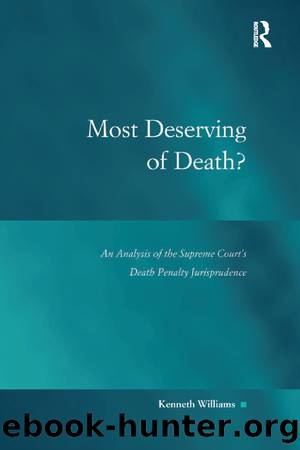Most Deserving of Death? by Kenneth Williams

Author:Kenneth Williams [Williams, Kenneth]
Language: eng
Format: epub
Tags: Social Science, Death & Dying
ISBN: 9781317094067
Google: kMkFDAAAQBAJ
Publisher: Routledge
Published: 2016-04-15T05:08:37+00:00
Volunteers
The first scheduled execution after the death penalty was reinstated in 1976 involved Gary Gilmore. Gilmore attempted suicide six days after telling the Utah Supreme Court that he did not wish to pursue his appeals. Both the Utah Supreme Court and the United States Supreme Court allowed Gilmore to waive his appeals and he was executed.41 More than 100 inmates have also waived their appeals and volunteered to be executed since 1976.42 Whether an inmate sentenced to death ought to be allowed to waive his appeals is a controversial issue. Those who favor allowing inmates to waive their appeals are usually in favor of capital punishment. They argue that the decision whether to appeal a conviction is vested in the client in non-capital cases and should likewise be made by the client even in capital cases. They also argue that, by volunteering, the inmate is accepting his punishment â which he should have a right to do. Those who believe that death row inmates should not be allowed to waive their appeals make several arguments in opposition. First, they argue that allowing an inmate to waive his appeals amounts to nothing more than state-assisted suicide. Second, they argue that the decision by a death row inmate to waive his appeals is really coerced and not voluntary given the horrible conditions of death row. Third, the inmate ought not to be allowed to waive his appeals in order to ensure that death is the appropriate punishment. Justice Marshall argued that without appellate review âan unacceptably high percentage of criminal defendants would be wrongfully executedâ either âbecause they were innocent of the crime, undeserving of the severest punishment relative to similarly situated offenders, or denied essential procedural protections by the State.â43 For instance, an individual may feel hopeless and waive his appeals despite the fact that he is innocent, or an egregious constitutional violation may never be remedied because of the lack of appellate review.
When a death row inmate wishes to waive his appeals he also creates a dilemma for his attorneys. Should the attorney accept the clientâs wishes or fight them? The attorney has several professional obligations to his client which may be in conflict with the clientâs desire to waive his appeals. An attorney is required to zealously represent his client. Furthermore, as the ABA Guidelines for the Performance of Counsel in Death Penalty Cases provides:
Some clients will initially insist that they want to be executed â as punishment or because they believe they would rather die than spend the rest of their lives in prison ⦠It is ineffective assistance of counsel to simply acquiesce to such wishes, which usually reflect overwhelming feelings of guilt or despair rather than a rational decision.44
The ABA Guidelines also place on an attorney the duty of conducting a thorough investigation.45 According to the Guidelines this investigation should be conducted irrespective of the wishes of the client.46 The Guidelines also place on the attorney for a death row inmate the duty of litigating all potentially meritorious claims.
Download
This site does not store any files on its server. We only index and link to content provided by other sites. Please contact the content providers to delete copyright contents if any and email us, we'll remove relevant links or contents immediately.
Cecilia; Or, Memoirs of an Heiress — Volume 1 by Fanny Burney(32544)
Cecilia; Or, Memoirs of an Heiress — Volume 2 by Fanny Burney(31942)
Cecilia; Or, Memoirs of an Heiress — Volume 3 by Fanny Burney(31928)
The Great Music City by Andrea Baker(31916)
We're Going to Need More Wine by Gabrielle Union(19034)
All the Missing Girls by Megan Miranda(15946)
Pimp by Iceberg Slim(14484)
Bombshells: Glamour Girls of a Lifetime by Sullivan Steve(14052)
For the Love of Europe by Rick Steves(13899)
Talking to Strangers by Malcolm Gladwell(13346)
Norse Mythology by Gaiman Neil(13345)
Fifty Shades Freed by E L James(13232)
Mindhunter: Inside the FBI's Elite Serial Crime Unit by John E. Douglas & Mark Olshaker(9318)
Crazy Rich Asians by Kevin Kwan(9275)
The Lost Art of Listening by Michael P. Nichols(7489)
Enlightenment Now: The Case for Reason, Science, Humanism, and Progress by Steven Pinker(7306)
The Four Agreements by Don Miguel Ruiz(6744)
Bad Blood by John Carreyrou(6610)
Weapons of Math Destruction by Cathy O'Neil(6264)
